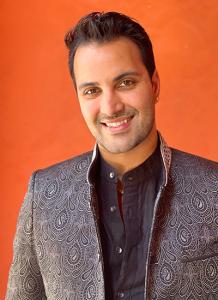Ved Chirayath

Professor Chirayath grew up in Southern California with a passion for NASA's mission and space exploration. In 2003, a sophomore in high school, he modified a consumer digital camera and telescope to successfully detect an extra-solar planet, 150 light years away, roughly twice the size of Jupiter. Since then, his research interests have relied on the intersection of multiple disciplines, including aeronautics, astrophysics, earth sciences, engineering, and optics.
In 2019, Chirayath's MiDAR invention was awarded a NASA Invention of the Year, chosen from among thousands of new technologies within the agency, for its novelty and potentially broad applications to advancing the state-of-the-art in sensing. In 2017, Chirayath received the NASA Early Career Award in recognition of “significant advances in aquatic remote sensing technology.
Scope and Content Note
Dr. Ved Chirayath is renowned for his innovative marine mapping technologies. He discusses his background, the significance of coral reefs, the challenges they face, and the need for data-driven policies. Dr. Chirayath highlights his work on projects like MiDAR, fluid lensing, FluidCam, and NeMO-Net, which revolutionized reef mapping and monitoring. He also discusses how these technologies can empower local stakeholders and governments to make informed conservation decisions and emphasizes the importance of engaging people and collaborating with indigenous communities to protect reefs effectively. Despite the obstacles, Dr. Chirayath remains hopeful for the future of coral reefs. He encourages young individuals to foster curiosity and pursue physics and mathematics, as these skills can open doors to groundbreaking discoveries in the Earth sciences.
Please Note: The oral histories in this collection are protected by copyright and have been created for educational, research and personal use as described by the Fair Use Doctrine in the U.S. Copyright law. Please reach out Voices@noaa.gov to let us know how these interviews are being used in your research, project, exhibit, etc. The Voices staff can help provide other useful resources related to your inquiry.
The NOAA mission is to understand and predict changes in climate, weather, oceans, and coasts, to share that knowledge and information with others, and to conserve and manage coastal and marine ecosystems and resources. The Voices Oral History Archives offers public access to a wide range of accounts, including historical materials that are products of their particular times, and may contain offensive language or negative stereotypes.
Voices Oral History Archives does not verify the accuracy of materials submitted to us. The opinions expressed in the interviews are those of the interviewee only. The interviews here have been made available to the public only after the interviewer has confirmed that they have obtained consent.
